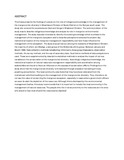| dc.description.abstract | This thesis presents the findings of a study on the role of indigenous knowledge in the
management of the mangrove bio-diversity in Msambweni Division of Kwale District on
the Kenyan south coast. The study site covered the area between Gazi and Vanga in
Msabweni Division. The central problem of the study was to describe indigenous
knowledge and analyse its role in mangrove environmental management. The study was
also intended to identify the existing knowledge which is utilised in the management of
the mangrove ecosystem and to describe perceptions towards the present day institutional
location of the mangrove management responsibility and how these influence the
management of the ecosystem.
The study was carried out among the residents of Msambweni Division. the majority of
whom are Wadigo, a sub-group of the Mijikenda ethnic group; Between January and
March 1998.
Data collection methods included key informants, focus group discussions, observation
methods, the survey method, and the use of secondary data. Qual itative methods of data
analysis were used. These were supplemented by descriptive statistical methods to
analyse the impact of various variables on the conservation of the mangrove bio-diversity. Accordingly indigenous knowledge, the institutional location of natural
resources management responsibility and coordination among stakeholders are
found to have an influence on the success of conservation efforts.
Findings from the study show that the mangrove bio-diversity is threatened
through excessive harvesting of trees, poaching and pollution. The local
community also feels that they have been alienated from the mainstream
activities touching on the management of the mangrove bio-diversity. They,
therefore, do not see the value of conserving the mangrove ecosystem,
especially in cases where government officers are seen to abet the depletion
of the resources.
Although this is dismissed by the environmental management bodies, this
study recommends that it is important to include the local community in the
management of natural resources. The people who live in close proximity to
the resources are the ones who stand to lose most should the resources be
depleted | en |

